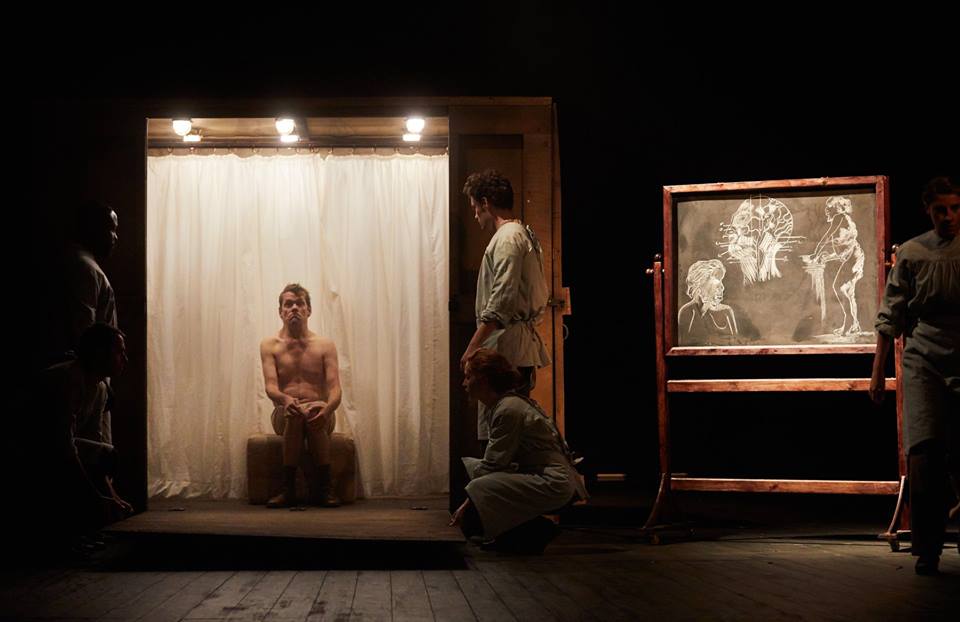
This production of The Elephant Man is the product of a three-way collaboration from the Bristol Old Vic, the Bristol Old Vic Theatre School and Diverse City, the latter being an organisation committed to promoting diversity and equality in the arts. Bernard Pomerance’s play premiered over forty years ago and since then it has garnered many awards, though some critics have been distinctly unhappy about one of its key features. Unlike the well-known movie starring John Hurt it requires no prosthetic make-up for its lead role. This shifts the focus away from special effects, and gives actors an opportunity to demonstrate their physical skills at conveying deformity. The unfortunate consequence of this is that it has often become a celebration of an able-bodied actor’s physicality, rather than an honest examination of our attitudes towards disability.
This version confronts this problem head-on by casting a disabled actor, Jamie Beddard, as John Merrick. He has cerebral palsy and is a wheelchair user and, as he reveals in his interview with Graham Wyles, he worries that the favourable reviews he has received in the past might have been overly sympathetic, joking that he won’t feel he’s a ‘real’ actor until he gets a bad one. I have to disappoint him yet again, for here he gives a profoundly touching performance, brilliantly conveying Merrick’s sharp intelligence, quiet dignity and romantic imagination – Merrick tells us that he wonders if he has a large head ‘because it is so full of dreams’. He is well supported by Alex Wilson as Frederick Treves, the doctor who rescued Merrick from the humiliation of being a fairground ‘attraction’ and who brought him under the kindlier care of the London Hospital. Wilson captures Treves’ conflicted personality well, showing us a man whose loss of religious faith leaves him clinging fiercely to a strict moral code that occasionally leads him to be cruel rather than kind.
Among the other performances, Gráinne O’Mahoney is outstanding as Mrs Kendal, the famous actress who befriends Merrick. Mrs Kendall’s profession has given her rare insight into the difference between appearances and reality, and once she has overcome her initial shock at Merrick’s outward deformities she is quick to see the sensitive human being within. She is also perhaps the only one of his visitors to see him as a man. This realisation leads her to disrobe before Merrick, allowing him a glimpse of the kind of beauty that he had only dreamt of before. Her kindness and generosity is direct and entirely honest, but it is not rewarded for their intimacy is interrupted by Treves, who promptly banishes her from the hospital. Treves’ humane instincts are compromised by his rigid adherence to hard and fast notions of propriety. Merrick is confined not only by his disability; he is also restricted by ‘rules’ that do not apply to other men.
It is in these intimate scenes that this play works best. There are other less successful sequences, particularly in the earliest scenes, where the style of speech is very declamatory, like that of fairground showmen. This is fine for Merrick’s employer, Ross, for he is a fairground hustler, and Micky Dartford plays him with wheeler-dealer gusto. But elsewhere there is too much speechifying and didactic signposting of themes. A little Brechtian alienation of this kind can go a long way. However, designer Caitlin Abbott’s inventive set makes good use of this ‘sideshow’ theme, and she has embraced the play’s unashamed theatricality and artifice very effectively.
The Elephant Man is not without its flaws, but it does have important things to say. As director Lee Lyford has said, ‘it’s about how we treat people who are ‘different’ from us, and how we concern ourselves with the idea of ‘other’’. It looks closely at the motives that often lie behind apparently charitable behaviour. Merrick proved to be a popular money-spinner for the London Hospital, but would middle and upper-class Victorian society been so willing to accept him as one of their own had he not been a ‘gentleman’, capable of discoursing knowledgably about Shakespeare and the Bible? In their determination to normalise him, did they deny his otherness?
In the final scene Merrick casts away the pile of pillows that prop up his huge head, and he rests flat, like ‘normal’ people. This leads to asphyxiation, and he dies. Is this a failed attempt to be just like everyone else? Fate had left him at the mercy of other people’s cruelty and kindness. Does he in the end he choose to fight against the arbitrariness of fate and take control over his own life, by ending it? That is not the only question you will ponder having seen this thought-provoking and often deeply moving show. ★★★★☆ Mike Whitton 29 June 2018

